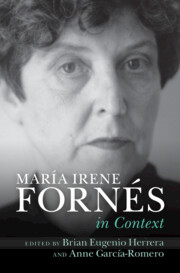Refine search
Actions for selected content:
2 results

María Irene Fornés In Context
-
- Published online:
- 27 August 2025
- Print publication:
- 07 August 2025
Chapter 18 - Hispanic/Latinx/Latiné
- from Part III - Culture, Society, and Politics
-
-
- Book:
- María Irene Fornés In Context
- Published online:
- 27 August 2025
- Print publication:
- 07 August 2025, pp 194-204
-
- Chapter
- Export citation
